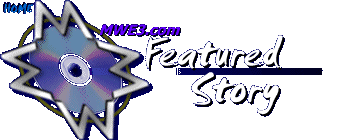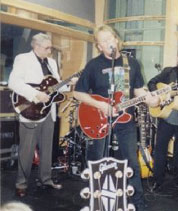|
Part
2
continued from
previous page
Scotty Moore:
SM
Robert Silverstein: RS
RS: Scotty, it’s Robert Silverstein from 20th Century Guitar and
mwe3.com. I interviewed Alvin Lee last week and the mag is putting both
you and Alvin on the July 04 cover with the In Tennessee album
as a jumping off point.
SM: Oh, well thank you.
RS: I told him that both you and Alvin did a great job on the Alvin
Lee In Tennessee album which was released on CD in May 2004.
SM: Yeah, it’s getting alot of play around the world. I just played
on a couple things. It was real fun.
RS: Alvin says you masterminded the sessions. (laughter) You met Alvin
at the unveiling of Gibson Guitars limited production Scotty Moore signature
ES-295 in London you and Alvin started talking about making an album
together.
SM: Well I met him there and he had been over here way back. I can’t
remember what year at our tape shop. We had a tape duplicating company
at the time and there were some pictures made with me and him made on
the porch, and I had forgotten all about it, it’d been so long.
So...I didn’t play for like 24 years. I didn’t even hit a
note.
RS: How did the album take off from there?
SM: It was just something we kind of talked about over time. He got
all his songs together. Of course...and he plays so fast. Whew! (laughter)
RS: He’s a real great player...
SM: He sure is. I love it. He’s great.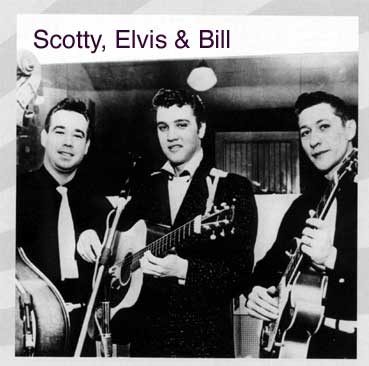
RS: Alvin’s album pays a great tribute to ‘50s sound of the
band you and Elvis had back in ‘54.
SM: Right.
RS: It
sounds very mid to late ‘50s. Very warm sounding. What kind of
sound were you shooting for with Alvin?
SM: The best way I can say it is, some of the stuff you listen to today
you obviously know what they’re going to play before they play
it. I don’t know if that makes any sense or not. You don’t
know what he’s (Alvin) going to do (laughter) that’s for sure!
RS: Pete Pritchard plays bass on Alvin’s CD. He’s your bass
player?
SM: Yeah, every time I go overseas he does. If the money allows, I’ll
bring him over here every time I do something.
RS: Pete took those cool pictures of you and Alvin?
SM: Evi,
Alvin’s girlfriend took a bunch of pictures but I haven’t
seen those. Pete took some also, but I haven’t seen his. She can
get you some good ones. I know she took a whole bunch. Plus on the road
also so you got both of them.
RS: Gail told me there’s a 50th anniversary celebration planned
to honor the day you and Elvis and Bill Black recorded “That’s
All Right” on July 5th 1954.
SM: Sun Records is...well, the studio, Sun studio, they’re going
to play “That’s All Right (Mama)”...it’s either
ten or eleven o’clock in the morning and it’s going off by
satellite all over, I don’t know how many stations, I haven’t
talked to anybody lately. And I’m going to have the honor of going
there and pushing the button! That’ll be fun. And then there’s
gonna be a block party starting right after that and it’ll go...hell,
it may go for a week, (laughter) who knows? (laughter)
RS: So they’re linking up a number of radio stations to play the
song at the same time on July 5, 2004 to break a world record?
SM: Exactly, there’s a whole bunch. I really don’t know how
much. There’s a girl, I can’t think of the name of the company
in New York that’s doing the publicity on it. Her name is Debbie,
Deborah Sternberg of Goodman Media International, and she would know
all that immediately.
RS: “That’s All Right” is considered the first real rock
and roll song and also the start of the Sun sessions.
SM: Well, I don’t really consider it as being the first but it
is the first one that’s gotten all the attention over the years
and he became such a big star too. “Rock Around The Clock”
would have been before ours. And what was the other one by, another
one I can’t think of it...Jackie Brenston was the artist. He was
on Sun also. But I can’t think of the name of the song! It was
kind of in the same vein. But I don’t think anybody’s complaining
about it. It’s okay...
RS: “That’s All Right” is credited to “Elvis Presley,
with Scotty and Bill”. Was that song recorded the same day you
first met Elvis because there’s conflicting reports as to the day
you met him?
SM: It was the day before...
RS: You met him on July the 4th, 1954?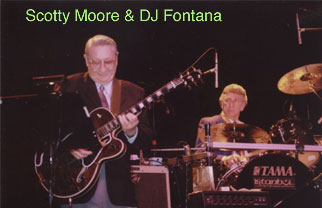
SM: Right.
RS: So you met Elvis Presley July 4th. At Sam Phillips’ house?
SM: No, it was at my house. Sam and I had become good friends. See,
I had a group that Sam released a record on. It was country songs. But
through that we became real good friends. And I would go down and we’d
meet in the afternoon and talk, just talk about generalities. And one
day his secretary, Marion Keisker, was having coffee with us and she
brought Elvis’ name up, although she didn’t explain his name.
She said, ‘how about that boy that was in here last week or so?
What’d you think about him?’ Sam just nodded and said, ‘oh
yeah, he was so and so...’ And then I bugged Sam then for a couple
weeks, so he finally told Marion, ‘get that boy’s name and
give it to Scotty.’ And he turned to me and says, ‘give him
a call and ask him over your house and see what you think about him.’
That’s where it all started!
RS: Wow.
SM: He came over my house and sang a couple of songs, I mean a couple
of hours. Seemed like he knew every song in the world! Country, pop,
you name it! Just anything. And Bill Black lived a few doors from me
at the time and he came down and listened for a while and he left. Then
when Elvis left, Bill came back and we talked about it. What we really
liked was the rhythm in his voice, if you understand what I’m saying.
It’s not just staccato type, he’s not like you’re reading
a book or something, word by word. It flows. He had a real knack for
that. The songs he didn’t know all the chords to playing lead guitar...he’d
just keep singing. He’d (laughter) come back singing till he come
back to the right place. We he left, I called Sam (Phillips) and relayed
all this to him. And he said, well he said, ‘I’ll call him’,
he said, ‘come in tomorrow night. We don’t need the whole
band, I just need you and Bill come over to the studio. I just want
to see what Elvis sounds like on tape with a little music behind it.
And that’s where we cut “That’s All Right”. It was
an audition.
RS: It’s amazing...it’s just such a...
SM: The funny thing of it is that he never said, Sam never said, and
Bill and I didn’t know...neither one of us knew that song, “That’s
All Right (Mama)”. And we don’t know if Elvis did that to
impress Sam, that he knew some of the material that he had released
before or not. But Sam liked the way that he did it and that was what
we thought and that’s what we still think to this day. It wasn’t
the fact that he owned the publishing on that song.
RS: Oh, so Sam owned the publishing on that?
SM: Yeah. Right, but it was never mentioned.
RS: How many takes did you guys do on that song?
SM: I don’t remember exactly. It wasn’t very many. Like maybe
four or five maybe. We only used three mics. There was a mic on the
amp on my guitar, one on Bill’s bass. There was one mic on Elvis’
voice and it picked up his guitar at the same time. There was a couple
times Sam had to stop and back off, play something a little lighter
or if he popped the mic with his voice or something like that. Three
or four cuts.
RS: 1954. I was born in 1954.
SM: Really? (laughter)
RS: Do you remember anything else about that year? There was so much
enthusiasm...
SM: The only thing I can remember now, immediately...we got that record
and the back side. Bill Black came up with that side.
RS: With “Blue Moon Of Kentucky”?
SM: The same identical way, we went back in the studio...well let me
back up a little bit. Sam took the demo home, of “That’s All
Right” down to Dewey Phillips, who was no...he wasn’t kin
to Sam. But he was on the radio. And he left the demo for Dewey to listen
to, to give him his impression of it. Well, unbeknownst to Sam, Dewey
played the thing on the radio over and over! He called Elvis down there
and put him on the air! (laughter) So we had to rush back in about two
nights later. And again we went through song after song. And we were
trying to find something that would finally fit the way we had done
“That’s All Right”. And Bill...again just a comedy. He
was still sittin’ on his bass and he started beatin’ on it
and singin’. “Blue Moon Of Kentucky”, if you remember,
was a country song, a waltz. It was done by Bill Monroe. But Bill started
singing it in a high tenor and singing it fast. And Elvis knew it and
he started singing along with him and that was the b side. (laughter)
It was real interesting how it all happened.
RS: They’re still so great to listen to.
SM: Well I’ll tell you what...the thing that I’m impressed
by more than anything else is how well the music has held up all these
years. Of all the stuff cut back in those days, that’s the things
that we get requests to do. After he went into Vegas and had the big
band and all that...and all that was great. He sounds good. But the
people seem like they want to hear the early stuff. It’s amazing
to me. I don’t quite understand that. I’m glad, but...(laughter)
RS: You’ve said for all of the Sun Sessions, with the exception
of the last one, you used the ES-295.
SM: No, no...I had the ES 294 starting. What I started with on “Mystery
Train”...I had bought an amp that had an echo built into it.
RS: The echo-sonic amp?
SM: Echo sonic. Correct.
RS: Do you remember which guitars you were using on “That’s
All Right”? 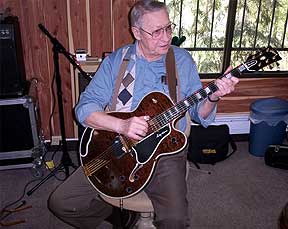
SM: Oh, that was the ES-295. I already had that before we cut the first
thing. Then, on “Mystery Train” I had traded the ES-295 and
I had a Gibson L-5 and a new amplifier also. I made a few bucks. Wasn’t
much but it was enough to buy another guitar!
RS: Any other guitars you can remember really liking back in the
‘50s?
SM: I’ve always been partial to L-5’s over the years. I’ve
got more than I can play now. They keep giving ‘em to me. I appreciate
‘em and I love guitars but I want to play one at a time so...
RS: Last
December Gibson presented you with an award for playing Gibson guitars
for 50 years.
SM: Right, they did it just when I was, when they had that party.
RS: Where?
SM: In the hospital. I didn’t get to go to the party! They had
about 400 people there. They had a helluva time! I’ll tell you.
I had a couple of holes drilled in my head...but it’s all coming
back though, slowly but it’s getting back there okay.
RS: You mentioned you’re still playing the Chet Atkins Country
Gentleman Chet actually gave you back in the ‘80s.
SM: Just when I started back playing was when he gave that to me...
RS: It’s great to see that you’re still on tour. I see you
just played St. Louis this weekend.
SM: Right, at Casino Magic Bay in St. Louis, Mississippi.
RS: You’re on tour with with Ronnie McDowell, DJ Fontana, and the
Jordanaires?
SM: Right, on drums was D.J. Ronnie’s son is playing drums now
also. So we use two drummers. Jordanaires were there and of course Ronnie
and his band. They all are fine musicians.
RS: Do you still play the rock and roll music from the ‘50s?
SM: Not all of it. We try and play a little of all of it, starting from
day one and picking out a few songs all the way down the line.
RS: Are you coming up to play New York City anytime soon?
SM: I haven’t got anything scheduled right now. I’m going
to try and play around two or three days a month, just enough to try
and keep on top of everything. If you sit down and just start the television
you’re not going to get anywhere.
RS: Also new on the Elvis front, RCA Records is making the most of the
50th anniversary celebration of “That’s All Right” this
July, starting off with a new CD at the end of June 2004 called Elvis
At Sun.
SM: Haven’t heard any word on that yet. I guess Jorgenson has that
all sowed up. He’s the official word on everything if it has to
do with Elvis.
RS: They say the CD features 19 essential Sun tracks you and Bill Black
made with Elvis in the best ever sound quality and they add, it’s
like night and day compared to what’s come out before.
SM: Well the sound quality’s fine if they don’t mess with
it, don’t start running it through Pro-tools and doing all kind
of games to it.
RS: I heard for some tracks on the new Elvis At Sun CD like,
“Blue Moon Of Kentucky”they remastered from a Sun Records
78! That’s how they actually came out back pre 45rpm? They said
the sound quality is better than the tape they have. Where did they
get a 78 to remaster from?
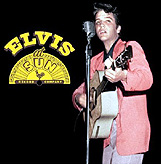
SM: I don’t know...there’s a few around. I’ve got one
on my wall in here.
RS: The guy at RCA, Jorgenson said they also found a new tape of “That’s
All Right” and six other tracks like “Good Rockin’ Tonight”.
SM: No tellin...
RS: And
they say on the new tape, there’s a full fade out version of “Mystery
Train”.
SM: It’ll be out. I guarantee you.
RS: Coinciding with the Elvis At Sun CD, RCA is also releasing
a 3 DVD package on the Elvis: ‘68 Comeback Special.
SM: Oh, that’ll be good.
RS: Can you share some memories how you felt reuniting with Elvis
for the ‘68 comeback special that was recorded for Television at
the NBC studios in Burbank?
SM: We’d been playing all along with him, we were doing all of
his sessions stuff. But when he did the comeback special, that was the
first thing, see he’d been in the movies all this time. But that
was the first thing he’d done on television or anything else. And
it was fun. We had a ball going out there and doing that. What I’m
trying to say is, it wasn’t a comeback for us, we had been working
with him on record sessions all along. I had a studio here in Nashville
and D.J. and Jordanaires and the other musicians were working their
butts off.
RS: RCA said they interviewed both you and D.J. for the ‘68 comeback
DVD but they’re going to save the ‘making of’ the DVD
for yet another DVD documentary release!
SM: (laughter) I don’t know anything about that either!
RS: But they did interview you and D.J.?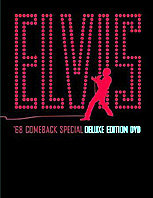
SM: Well...D.J. and I went down... See we had never seen the second
show. We did two. And they had took pieces out of both of them and put
‘em together. And we went down somewhere here in town and watched
both shows and they had a mic and they just asked us to make comments
during it. But it wasn’t a real...I don’t remember anything
being an actual interview y’know? We just kind of talked along
when things were happening.
RS: They said only a small portion of what got shot actually made it
to the original ‘68 TV broadcast.
SM: They could have. I don’t really know.
RS: I hear the Elvis estate is also planning a be-all and end-all Elvis
documentary to be completed by 2006 or thereabouts...
SM: They can say be-all and end-all...it won’t be the end of it!
(laughter)
RS: And they’re also planning an Elvis mini-series for next year
and another network special for this year? The Elvis phenomenon just
keeps getting larger than life.
SM: That’s great but the thing I enjoy most is the music. As long
as the music is staying up there, it’s okay. I don’t care
what they do.
RS: You and Carl Perkins recorded and album released on your Belle Meade
label called 706 ReUnion.
SM: Correct.
RS: Any memories of making those albums with Carl Perkins. When
did you first meet him?
SM: Well I’ve known Carl from practically day one and I was born
just about, oh I’d say about fifteen miles or something like that
from each other. And I was about four months older than Carl. We’ve
just known each other off and on through the years. Used to be close
friends. The reason I didn’t try to put it out through the normal
channels is we talked throughout the whole thing. We talked in between
each song. The fans I found really love it, but I couldn’t get
a big label interested at all...’nobody’ll buy something like
that’...y’know? It’d be interesting to get your output
on it.
RS: You also had a hand in the critically acclaimed 1997 CD All The
King’s Men.
SM: Right.
RS: That found you in the company of some great musicians like Jeff
Beck, Keith Richard and Ron Wood. How did you assemble so many great
players for that album? Will there ever be a follow up to that?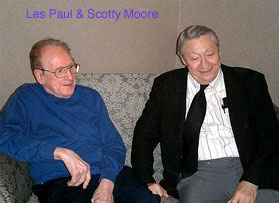
SM: Well, I don’t know. I’d like to do another one but like
I said, they drilled in my head last December. That’s why I missed
that party. I’ve been working on my coordination. It’s not
up to snuff like I want it to be. But I’m working on it. I’ve
been going to a chiropractor and he’s been getting my hand back
and it’s working pretty good. So, I don’t know, but I would
love to do another one. Really would.
RS: In 2000 you were inducted in the Rock and Roll Hall Of Fame
by the songwriting team Jerry Leiber and Mike Stoller.
SM: Right.
RS: Can you remember how did you and Elvis meet Leiber and Stoller in
the first place?
SM: Well, that was actually through the publishing company that was
hooked up with RCA. They just started bringing in piles of songs and
stuff to listen to and that’s where we met ‘em. And then,
when they saw that he was going to make ‘em some money, well they
put his name on it and started up a publishing company and gave him
part of it of course.
RS: Doc Pomus also wrote some great songs for Elvis like the 1961 single
release “Little Sister” which was backed with another Pomus
/ Shuman song “His Latest Flame”.
SM: Right, that was a good one.
RS: Can you recall how you and Elvis met Doc Pomus?
SM: I really don’t. I met so many people. Lieber and Stoller, of
course we did quite a few of theirs and I do remember them. But most
of them, weren’t too many songs. Just one here and there. Some
of them I never even saw. We’d have a demo, we’d hear it and
cut it.
RS: Hank Garland also played guitar with you and Elvis on alot of those
early ‘60s Elvis Presley sessions.
SM: Right, Hank did one session that I wasn’t even on period when
Elvis came home on boot leave, he went in the army. But Hank had been
on alot of the sessions with us but he’d be playing six string
or something else...he wasn’t playing lead on those. And then he
played on one, Hank played on one show in Tupelo. It was Elvis’
hometown. We’d been there once before and played one and next time
we went back. It was when Bill and I had quit the organization.
RS: Chet Atkins also played guitar on some of the early Elvis sides
like “Heartbreak Hotel”.
SM: Chet played rhythm guitar on “Heartbreak Hotel” and then
one other song from the same session that he played rhythm guitar on.
When we were working up the song, I turned to Chet and I said, ‘cause
I mean everybody in the world loved Chet. He was a great guitar player.
And I remember when we were working on that song, I turned to Chet and
I asked him, I said, ‘do you think what I’m playing is okay?’
He said, ‘I don’t know man, I’m playing rhythm.’
(laughter) He wouldn’t say yes or no. (laughter)
RS: It’s amazing how many guitarists were influenced by the sound
of you Elvis and Bill back then. Were you and Elvis friendly with other
icons back then like Buddy Holly and Chuck Berry?
SM: The ones that we got to meet and see, yes we were. In the very early
days they booked us night after night. Figure three guys in a ‘53
Chevrolet with the bass fiddle inside. (laughter) And two or three hundred
miles to go too!
RS: Was there ever talk about Buddy or Chuck writing for Elvis. Was
that out of the question?
SM: Oh, I mean we discussed all of ‘em and heard all the records.
It was all positive for sure. I can’t think of anybody that any
of us didn’t like, really.
RS: I was eight in ‘62 when I bought my first Elvis single, “Return
To Sender”. Did you play on that song?
SM: Yeah. I can’t even remember what I played to tell you the truth.
Yeah, I played on that. He was in his Mario Lanza...”Now Or Never”
is along the same line.
RS: “Return To Sender” lists you, Barney Kessel and Tiny Timbrell
on guitars.
SM: Tiny Timbrell. I know Tiny was on it. I don’t remember if Barney
was on that one or not. Maybe so.
RS: Do you remember the way the guitars were recorded on that track?
SM: I’d have to listen to it. When he was doing movies with different
players...I can’t tell till I listen to something. (laughter) I
don’t know if I was playing rhythm guitar or lead or what.
RS: “Return To Sender” was written by Otis Blackwell, who
was a pretty amazing songwriter back then. 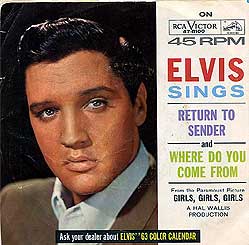
SM: Yes he was.
RS: Could you mention a few of your early guitar influences?
SM: Well, when I came out of the Navy, I started getting real interested
in playing. Nobody tells you who was playing on it, except who was singing.
So it was years later before I found out...Of course Chet and Cory did
instrumentals, they will tell you of course. And a couple others like
that.
RS: I know you’ve jammed with Les Paul?
SM: Yeah, but nobody could play what he played ‘cause he did all
the overdub stuff! (laughter) We could play the melody and that’d
be it. Oh, Les is great. He’s a fun guy. I still see him every
chance I get.
RS: Les
just celebrated his birthday...
SM: I believe it was 89 and he’s still playing! Great. He was down
here last year I think it was.
RS: What kind of influence do you think Les had?
SM: I think Les was an influence on many, many players especially if
they saw him. Like I said, the records of course, when he did all the
stuff with Mary Ford, were things that were publicized...so, there were
so many guitar licks on there you couldn’t even figure them out
really.
RS: Because you weren’t only interested in country and western,
you were influenced by jazz players too.
SM: Oh, yeah. I just love music period.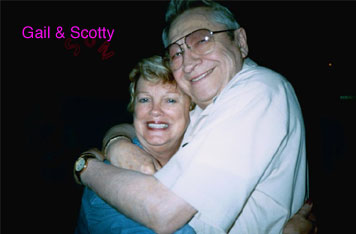
RS: You mentioned Tal Farlow.
SM: Oh yeah, Tal was great. Kessel was great too. I liked Barney.
RS: How about Django?
SM: I loved to listen to him. I didn’t play the things he did.
RS: Any other recording or concert plans or any other news you could
fill us in on?
SM: Like
I said, I’m getting this arm back in shape. I’m all for doing
some stuff. I really am but I just want it to be right to me even. Whether
it’s right to somebody else or not! (laughter)
RS: Again congratulations on the 50th anniversary of rock and roll!
SM: It’s going to be a real hoot, I tell you, when we get down
there...I appreciate your calling. Anything you think of that I didn’t
touch on, well feel free to give me a call.
RS: I’ll call Gail.
SM: She’s taking care of me good. Well, she knows most of it anyway.
Alright, bye-bye...
Thanks to Alvin Lee & Evi @ www.alvinlee.com,
Ron Rainy @ Rainman Records, Scotty Moore & Gail @ www.scottymoore.net
Arnie Goodman & Karen Usher @ www.bluestormmusic.com
, James V. Roy and Universal Music

|
